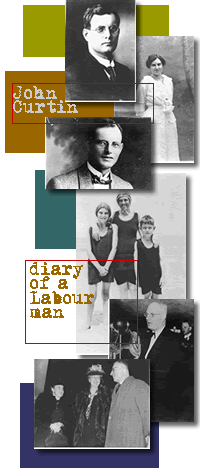


Following his election as Member for Fremantle in late 1928, John Curtin arrived in Canberra in February 1929 to attend his first sitting of parliament, a move that heralded a period of ongoing adjustment for Curtin and his family. Elsie and the children accompanied him, returning to Perth in April. Back in WA, his family had to adjust to a life where husband and father was absent for long periods. Staying in hotels in Canberra, Curtin had to cope with loneliness and the loss of the family environment he treasured, while focussing on issues such as disunity in the Labor Party and the onset of the Depression.
After losing his seat to his old adversary William Watson in December 1931, Curtin remained in Perth and unsurprisingly, he ‘revelled in the opportunity to be at home with his family’ and enjoy a normal family life, walking, gardening and going to the beach. His daughter Elsie recalls ‘happy winter evenings by the fire’ when her mother played the piano and her father lay on the sofa and read. After a three-month break, Curtin returned to journalism, working for the Westralian Worker as a sports writer and contributing regular columns to the West Australian and the Daily News.
In February 1933, he took up a position on the Metropolitan Milk Board and, after Labor won the State election in April 1933, he was appointed to chair the committee charged with writing WA’s submission to the Commonwealth Grants Commission. Later that year, he was made a Trustee of the Public Library, Museum and Art Gallery of WA.
After three years out of office, Curtin stood once more for parliament and won the seat of Fremantle again in the election of September 1934. Back in Canberra, Curtin was elected to the front bench of the Labor Party (then in opposition).
For the period when Curtin was out of parliament, the most useful sources of information were WA newspapers, notably the Westralian Worker which not only reported his activities, but also contained articles written by him. The regular columns he penned for the West Australian and the Daily News provide insights into his thinking on many contemporary issues.
While Curtin was MHR for Fremantle and particularly when parliament was sitting, Caucus meetings were held frequently, often daily, and the Caucus minutes from his election up to March 1931 indicate that Curtin was present at most meetings. After this date, a different secretary recorded the minutes and no longer noted the names of those present but it seems likely that Curtin continued to attend conscientiously. These sources, together with abstracts of his speeches and the Records of the Commonwealth Grants Commission show that Curtin, whether in government, in opposition or out of parliament, worked hard for his fellow man and for the Australian Labor Party.
We invite you to explore the diary of Curtin's life on the backbenches from 1928 to 1935.
 |
 |
 |
 |
 |
|||||||||